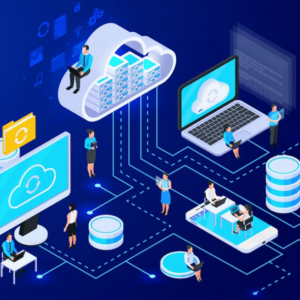Introduction
In today’s digital age, the term “cloud computing” has become increasingly prevalent. But what exactly is it, and how does it impact our daily lives? This article aims to demystify cloud computing, providing you with a comprehensive understanding of this transformative technology.
Understanding Cloud Computing
Cloud computing is a revolutionary approach to computing that has reshaped how we store, access, and manage data and applications. It involves the delivery of various services—such as storage, processing, and networking—over the internet, eliminating the need for local servers or personal devices to handle these tasks.
Types of Cloud Services
- Infrastructure as a Service (IaaS): This cloud service provides virtualized computing resources over the internet, including servers, storage, and networking.
- Platform as a Service (PaaS): PaaS offers a platform that allows developers to build, deploy, and manage applications without the complexities of infrastructure management.
- Software as a Service (SaaS): SaaS delivers software applications via the internet on a subscription basis, eliminating the need for installation and maintenance.
Advantages of Cloud Computing
The adoption of cloud computing has brought forth numerous benefits, making it a game-changer for individuals and businesses alike.
1. Cost-Efficiency
Cloud computing allows organizations to reduce IT costs by eliminating the need for extensive hardware and infrastructure investments. You only pay for the resources you use, which can lead to significant savings.
2. Scalability
One of the key advantages of cloud computing is its scalability. You can easily scale up or down based on your needs, ensuring you have the right amount of resources at all times.
3. Accessibility
With cloud computing, data and applications are accessible from anywhere with an internet connection. This flexibility promotes remote work and collaboration.
4. Reliability
Cloud service providers often boast high uptime percentages, ensuring your data and applications are available when you need them.
5. Security
While security concerns persist, cloud providers invest heavily in robust security measures, often surpassing what individual organizations can achieve.
Disadvantages of Cloud Computing
Despite its many advantages, cloud computing is not without its drawbacks.
1. Security Concerns
Storing sensitive data on remote servers raises security concerns. However, cloud providers continuously enhance security protocols.
2. Downtime
While rare, cloud service outages can disrupt operations. It’s essential to have backup plans in place.
3. Data Transfer Speeds
The speed at which data transfers to and from the cloud can be limited by your internet connection, impacting performance.
4. Limited Control
With cloud computing, you have less control over the infrastructure, which can be a concern for some organizations.
Cloud Computing in Everyday Life
Cloud computing has become an integral part of our daily lives, often without us realizing it.
1. File Storage and Sharing
Services like Google Drive and Dropbox use cloud technology to store and sync files across devices, making it convenient for users to access their data anywhere.
2. Streaming Services
Popular streaming platforms like Netflix and Spotify rely on cloud servers to deliver content to users, ensuring seamless streaming experiences.
3. Email Services
Email providers such as Gmail and Outlook use cloud-based servers to store and deliver emails, ensuring accessibility from any device.
4. Social Media
Social media platforms store vast amounts of user-generated content in the cloud, making it available to millions of users simultaneously.
The Future of Cloud Computing
As technology continues to evolve, so does cloud computing. Future developments may include even greater automation, enhanced security measures, and increased integration with emerging technologies like artificial intelligence and edge computing.
Conclusion
In conclusion, cloud computing is a transformative technology that has reshaped the way we interact with data and applications. Its advantages, such as cost-efficiency, scalability, and accessibility, make it a vital tool for individuals and businesses. While it’s not without its challenges, the benefits of cloud computing are undeniable.
FAQs (Frequently Asked Questions)
- What is the cloud?
- The cloud refers to a network of remote servers that store and manage data and applications, accessible via the internet.
- Is cloud computing secure?
- Cloud providers invest heavily in security, but users must also take precautions to protect their data.
- Can I access the cloud without an internet connection?
- No, the cloud relies on internet connectivity for access.
- How can I choose the right cloud service for my business?
- Consider your specific needs, budget, and scalability requirements when selecting a cloud service provider.
- What’s the difference between cloud computing and traditional computing?
- Cloud computing relies on remote servers and internet access, while traditional computing involves on-premises hardware and infrastructure.





